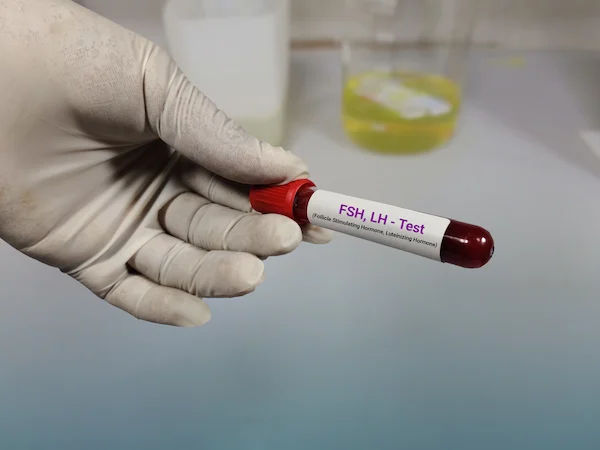Is Your Testosterone Low? How a Simple Test Can Help You Take Charge
Wondering if your testosterone levels are affecting your health? Learn how a simple testosterone test can help identify imbalances, improve energy, mood, and support overall well-being with early intervention.

Written by
Last updated on 6th Aug, 2025

Testosterone is a vital hormone that supports many aspects of male health, including energy, mood, sexual function, muscle strength, and bone density. While a gradual decline in testosterone is a normal part of ageing, some men experience a more significant drop that can lead to noticeable changes in daily life and overall well-being.
Symptoms of low testosterone, such as persistent fatigue, reduced sex drive, mood changes, and decreased physical performance, can be subtle but impactful. Fortunately, identifying a deficiency is simple. A routine blood test can provide valuable insight into your hormone levels and help guide you and your healthcare provider toward appropriate next steps. In this article, we explain how testosterone levels change over time, what signs may indicate a problem, and how testing can help you take control of your health.
Understanding Testosterone
Testosterone is widely recognised as the primary male sex hormone, but its role extends far beyond reproductive health. Produced mainly in the testes, this hormone acts as a key regulator of several vital bodily functions that influence physical, emotional, and metabolic well-being.
Here are some of the core functions of testosterone:
- Sexual Health: Testosterone supports a healthy libido, contributes to erectile function, and plays a central role in sperm production.
- Muscle and Bone Strength: It helps build and maintain muscle mass and strength, while also supporting bone density and reducing the risk of osteoporosis.
- Fat Distribution: Testosterone influences how and where the body stores fat, which can affect overall body composition.
- Red Blood Cell Production: It stimulates the bone marrow to produce red blood cells, which are essential for carrying oxygen throughout the body.
- Mood and Cognitive Function: Adequate testosterone levels are linked to stable mood, sustained energy, and sharper mental focus.
When testosterone levels are within a healthy range, men often feels more energetic, mentally alert, and physically resilient. Conversely, low levels may contribute to a range of symptoms that affect quality of life.
Are You Experiencing Low Testosterone Symptoms?
A slow drop in testosterone is a natural part of ageing for men. Sometimes referred to as "andropause" or "male menopause," this change is more gradual than what women experience during menopause. But when testosterone falls below healthy levels for your age, it can lead to a condition known as male hypogonadism, or simply low testosterone.
These symptoms can be easy to miss or confused with stress, ageing, or other health issues. That's why it's important to know what to watch for and seek medical advice if needed.
Common Low Testosterone Symptoms
Sexual Health Changes
- Reduced interest in sex
- Difficulty getting or keeping an erection
- Lower amount of semen during ejaculation
Physical Changes
- Constant tiredness, even with enough rest
- Loss of muscle strength and size
- Weight gain, especially around the belly
- Weaker bones, leading to a higher risk of fractures
- Thinning hair on the body and face
- Swelling or tenderness in the chest area
Emotional and Mental Changes
- Sudden mood changes or being more irritable
- Feeling down or anxious
- Trouble focusing or remembering things
- Less motivation or drive
Keep in mind that many of these symptoms can overlap with other health issues or life stress. That’s why seeing a doctor and getting tested is the best way to know what’s going on. A simple blood test can help figure out if low testosterone is the cause and guide the next steps.
Why a Testosterone Test Matters
If you’re experiencing symptoms of low testosterone, a testosterone test is the most direct and reliable way to assess your hormone levels. Even if your concerns are subtle, testing can help clarify whether your symptoms are linked to a hormonal imbalance.
A testosterone test involves a simple blood draw, typically performed in the morning when levels are naturally at their highest. Because testosterone can fluctuate throughout the day and due to other factors, your healthcare provider may recommend two separate tests on different mornings to confirm consistent results.
There are two key measurements used to evaluate testosterone levels:
- Total Testosterone: This includes all testosterone in your blood, both the active form and the portion bound to proteins. It provides a general overview of your hormone status.
- Free Testosterone: This measures only the unbound testosterone, which is biologically active and available for use by your body’s tissues. It often gives a clearer picture of how much testosterone is actually working in your system.
Book Total Testosterone Test Here
Your doctor will interpret these results alongside your symptoms, medical history, and physical exam. It’s important to note that “normal” testosterone ranges can vary slightly between labs and are influenced by age and other health factors. That’s why personalised evaluation is key to determining whether treatment or further testing is needed.
What Happens After a Low Testosterone Diagnosis
If your blood test shows that your testosterone levels are low and your symptoms match a condition called hypogonadism, your doctor will talk to you about possible treatments. One of the most common and effective options is Testosterone Replacement Therapy, or TRT.
TRT aims to restore testosterone levels to a healthy range, which can help relieve symptoms such as fatigue, low libido, mood changes, and reduced muscle strength. Treatment is tailored to your needs and may include one of the following methods:
Forms of Testosterone Therapy
- Injections: Administered every one to two weeks, either in a clinic or at home with proper guidance.
- Topical Gels: Applied daily to the skin (shoulders, arms, or abdomen) for direct absorption.
- Skin Patches: Worn daily to deliver a steady dose of testosterone.
- Implants (Pellets): Inserted under the skin during a minor procedure, releasing testosterone gradually over several months.
- Nasal Gel: Applied inside the nostrils for convenient daily dosing.
TRT can be highly effective, but it’s not suitable for everyone. Ongoing medical supervision is essential to ensure safety and long-term success.
Your doctor will help determine the best option based on your lifestyle, preferences, and medical history. They’ll also explain the potential benefits and risks, and monitor your progress through regular checkups and lab tests.
Lifestyle Support for Hormonal Health
In addition to medical treatment, your doctor may recommend lifestyle changes that support healthy testosterone levels:
- Exercise Regularly: Strength training and cardio can naturally boost testosterone.
- Maintain a Healthy Weight: Excess body fat is linked to lower hormone levels.
- Eat a Balanced Diet: Focus on whole foods, lean proteins, healthy fats, and vegetables.
- Get Quality Sleep: Aim for 7 to 9 hours per night to support hormone regulation.
- Manage Stress: Chronic stress can disrupt hormone balance. Consider mindfulness, hobbies, or relaxation techniques.
Get Your Health Assessed Here
Conclusion
Persistent symptoms of low testosterone, such as fatigue, low mood, reduced sexual function, and decreased physical strength, can affect your overall quality of life. If you feel unsure about discussing these concerns, remember that your doctor is a trusted professional who is there to help and support you.
Understanding what is happening inside your body is the first step toward feeling better. If you have noticed some of the symptoms mentioned in this article or feel that something is not quite right, consider speaking with a healthcare provider. A simple testosterone test can offer valuable insights and help guide your next steps. Taking action early can lead to improved energy, better mood, and a stronger sense of well-being.



.webp)
